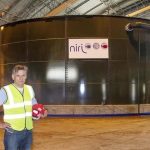Helping people through science
Merck Portugal is one of the few pharmaceutical companies that has been giving a voice to patient carers, particularly during the COVID-19 pandemic. But then that’s all part of it core philosophy. Essential Business learns how.
German multinational science and technology company Merck Group describes itself as a company that develops solutions to improve lives, “from great human questions to small everyday joys.” Curiosity drives its goal to offer excellence to patients and customers and to imagine the future.
During the pandemic, informal caregivers have increased and have been particularly vulnerable. Merck Group, a German multinational science and technology company with offices in the Oeiras Valley, didn’t turn a blind eye to the almost 1.4 million caregivers in Portugal. Instead, it organised a Caregivers Movement to raise awareness.
“Although the informal carer statute has been approved, there are too many carers that have no access to support” Pedro Moura, Merck’s Managing Director, tells Essential Business.
Merck’s purpose is working together ‘As one for Patients’. It believes that with this shared purpose of working as one, people will be engaged into creating a team
able to help patients and to prolong lives around the world, through innovation, research, and constant curiosity. Up to now, Merck has managed to bring together 24 associations from different areas to support this particular movement.
The approach entails helping caregivers, which in turn will contribute to improving patients’ lives.
“The movement to help informal carers arose from the need to reflect on how important carers are in a patient’s life, giving up so much in their lives to help others, despite their work being unrecognised,” Moura explained.
“It is vital, more than ever, to give informal carers a voice during the pandemic,” Moura adds. “With social support institutions having closed, they were forced to give up their time and professions to support people in need,” Moura stresses.
Embracing different and innovative areas
Merck is currently working in a vast range of areas, from fertility and cancer treatments to laboratory tools and products or technologies that contribute to the future of mobility and architecture, combining design with energy efficiency.
“We stopped being a classic pharmaceutical and chemical company a long time ago, to embrace innovative and different areas,” Moura says. Some of Merck’s priority areas are oncology and immunotherapy, fertility, where it is a market leader, and neurology with a focus on multiple sclerosis, but the company has also been successful in areas relating to hypertension, heart failure, endocrine disorders, diabetes, and thyroid disorders..
During the pandemic, Merck has also supported various other campaigns. One of these campaigns was carried out by the Portuguese Fertility Association and the Portuguese Society of Reproductive Medicine, to raise awareness about fertility problems but also to give out a message of hope: that many couples can overcome related problems and don’t necessarily have to give up on the dream of having a child.
Merck also implemented the Make Sense Campaign, to raise awareness about preventing head and neck cancer – which Moura says is little known despite being the 6th most common cancer in Europe, with 160,000 people diagnosed every year, 6,000 of which in Portugal. As well as providing information, Merck encouraged people to walk or run for this cause and to share the kilometres they achieved on social network sites, which it transformed in a donation for the Association of Investigation of Support Care in Oncology to carry out research in this area.
Now more than ever, Merck is embracing digital media, not only by reinforcing its presence on Facebook, LinkedIn and Instagram, but also by releasing a series of webinars about hypothyroidism, women’s health before and after she gets pregnant, fertility treatments during COVID-19 and caring for patients for multiple sclerosis during the pandemic. On realising that thousands of families in Portugal are facing great difficulties during the pandemic, Merck also donated money to the Network of Food Emergency.
Merck has kept busy looking for new ways to help patients and has achieved promising results in clinical trials for an immunotherapy drug, which has already been approved for the treatment of advanced renal cell carcinoma, but which it is evaluating for urothelial carcinoma. The trials confirmed that this therapy can fundamentally change the clinical practice for treating such patients.
In September, the company presented 30 papers at the congress of the European Society of Medical Oncology, related to advances in the field of oncology. That same month, at the annual meeting of the American Committee (ACTRIMS) and the European Committee (ECTRIMS) for the Treatment and Research in Multiple Sclerosis, Merck presented data on its multiple approved sclerosis treatments. There were a total of 54 studies, which included new data on the efficacy and safety of one of its medicines.
The COVID-19 pandemic has, of course, highlighted the need for science innovation to address global challenges, and Merck is involved in more than 45 vaccination programs and more than 35 diagnostic tests, as well as more than 20 molecular antibodies, plasma products and antiviral drugs. During the pandemic, Merck has also maintained its production and distribution in the rest of the world and, in each affected region, has provided patients with their medicines (unrelated to COVID-19).
Reimagining the future
“For over 350 years, curiosity has been – and continues to be – the driver that has led Merck to reimagine the future, to want to go further, always focusing on the patient, and on what we can do to improve people’s quality of lives,” Moura said.
The Oeiras Valley as a whole focuses on innovation, making it the perfect location for Merck. “We need to have conditions to take our innovation further, to materialise and transform it in real benefits for patients,” Moura pointed out.
Merck aims to be among the scientific and technological leaders in its business sectors and to overcome its competition in terms of sales growth and margin growth to continue to generate sustainable value.
Merck’s innovation success is achieved in partnership with iBET – the Institute of Experimental Biology and Technology – which is also based in Oeiras and which recently inaugurated a new laboratory there dedicated to developing biochemical tests and studying molecular interactions.
Within the Oeiras Valley, Merck has also worked closely with the Gulbenkian Science Institute and with the Oeiras Municipal Council on a fellowship that promotes exchange between researchers and innovative solutions for humanity. The Merck Family Foundation also supports the Gulbenkian Science Institute’s research grants for people from Portuguese-speaking African countries and East Timor.
While Merck operates in Portugal, its main headquarters is in Darmstadt, Germany, where it has an innovation centre with 7,100 squared metres divided in six floors, where initiatives, startups, visionaries and companies from around the world join synergies. But Moura says innovation can happen anywhere. “A curious mind is enough,” he said.
Text by Marina Watson Peláez










